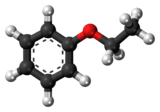Ethyl phenyl ether (or phenetole) is an organic compound that belongs to a class of compounds called ethers. Ethyl phenyl ether has the same properties as some other ethers, such as volatility, explosive vapors, and the ability to form peroxides. It will dissolve in less polar solvents such as ethanol or ether, but not in polar solvents such as water.[1]

| |

| |
| Names | |
|---|---|
| Preferred IUPAC name
Ethoxybenzene | |
Other names
| |
| Identifiers | |
3D model (JSmol)
|
|
| ChEMBL | |
| ChemSpider | |
| ECHA InfoCard | 100.002.854 |
PubChem CID
|
|
| UNII | |
CompTox Dashboard (EPA)
|
|
| |
| |
| Properties | |
| C8H10O | |
| Molar mass | 122.167 g·mol−1 |
| Appearance | Colorless to yellowish oily liquid[2] |
| Density | 0.967 g/mL[2] |
| Melting point | −30 °C (−22 °F; 243 K)[2] |
| Boiling point | 169 to 170 °C (336 to 338 °F; 442 to 443 K)[2] |
| 0.57 g/L[2] | |
| Hazards | |
| Flash point | 57 °C (135 °F; 330 K)[2] |
Except where otherwise noted, data are given for materials in their standard state (at 25 °C [77 °F], 100 kPa).
| |
Preparation
editEthyl phenyl ether can be prepared by the reaction of phenol with diethyl sulfate:
- PhOH + NaOH → PhO−Na+
- PhO−Na+ + Et2SO4 → Ph-O-Et
This reaction follows SN2 path.[citation needed]
See also
editNotes
edit- ^ a b "Phenetole". PubChem. 26 March 2005. Retrieved 2022-08-22.
- ^ a b c d e f Record in the GESTIS Substance Database of the Institute for Occupational Safety and Health
Additional references
edit- Organic Chemistry, Fessenden & Fessenden, 6th Edition, Ralph J. Fessenden et al.
- For Antoine constants: http://webbook.nist.gov/cgi/cbook.cgi?ID=C103731&Units=SI&Mask=4#ref-10